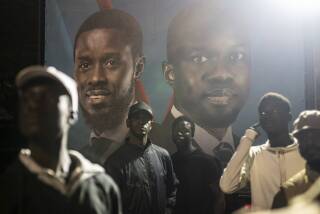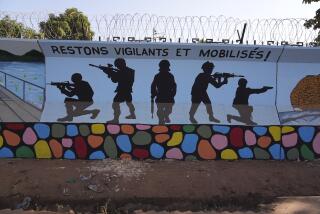Burkina Faso president’s attempt to extend 27-year rule backfires
One of Africa’s longest-serving leaders, President Blaise Compaore of Burkina Faso, was forced to dissolve his government Thursday after severely misreading popular anger over his attempt to extend his 27 years in power.
Compaore declared a national state of emergency after thousands of protesters invaded the parliament and burned it down, before attacking, torching or looting other major symbols of power in Ouagadougou, the capital. Those included the ruling party’s headquarters, city hall, houses of members of the ruling party, a hotel used by lawmakers and residences of members of the Compaore family, according to local radio.
Compaore, an influential regional power broker, insisted that his attempt to change the constitution so that he could contest elections next year was legal, but after a day of chaos and looting he was forced to back down and announce negotiations with opposition leaders.
Earlier, protesters broke into the headquarters of state television, which abruptly went off the air. The demonstrators were protesting a scheduled parliamentary vote to change the constitutional limit on presidential terms.
As chaos swiftly spread, the government announced that it had abandoned plans to change the constitution and Compaore tweeted out a call for calm.
But by then, the president had lost control of events. Opposition leaders said Compaore has lost his legitimacy and called for him to step down, and soldiers sided with the protesters in some areas.
Late Thursday, Compaore said he had heard the will of the people, dissolved the government, declared a state of emergency and called on opposition leaders to allow the country to return to calm, according to a statement read on radio.
“A state of emergency is declared across the national territory. The chief of the armed forces is in charge of implementing this decision which enters into effect today,” the statement said. “I dissolve the government from today so as to create conditions for change. I’m calling on the leaders of the political opposition to put an end to the protests. I’m pledging from today to open talks with all the actors to end the crisis.”
Military chief of staff Gen. Honore Traore announced a 12-month transitional government to return the country to a normal situation, without offering details.
But opposition leaders did not accept Compaore’s statement and called on their supporters to continue occupying public spaces.
With reports of several people killed and dozens injured Thursday, there was fear a prolonged confrontation between protesters
and the military could see more casualties in coming days.
Some observers suggested that although Compaore signed the decree for a state of emergency, military chiefs were in control. Traore announced a 7 p.m.-to-6 a.m. curfew, disappointing protesters, who for many hours hoped they had won the army over to their side.
United Nations Secretary-General Ban Ki-moon announced he would send a representative to Burkina Faso.
Compaore’s efforts to cling to power sparked a protest movement called the Citizens’ Broom. Like the “Arab Spring” revolts, Burkina Faso’s popular uprising rang out tweet by tweet. It was inspired by a revolutionary former president, Thomas Sankara, who was assassinated in the coup in which Compaore took power in October 1987.
Sankara, known as Africa’s Che Guevara and still widely loved in Burkina Faso, was known for his red beret and for eschewing the trappings of power, preferring to travel by bicycle and work in an office with no air conditioning. Sankara, a Marxist who took power in a 1983 coup, renamed the country from Upper Volta to Burkina Faso, roughly translated as “Land of Upright People.”
The removal of constitutional limitations on presidential terms by leaders seeking to rule for life has become common in Africa and other parts of the world, including the former Soviet Union and Latin America.
Among those who have changed the constitution to stay in power are Yoweri Museveni of Uganda, president since 1986; Paul Biya of Cameroon, in office as prime minister and then president since 1975; and Idriss Deby of Chad, in power since 1990. Other octogenarian and septuagenarian leaders, such as Zimbabwe’s Robert Mugabe and Angola’s Jose Eduardo dos Santos, have manipulated elections or constitutions to stay in power.
Although the African Union has always taken strong steps to condemn coups, it is weaker about criticizing efforts by leaders to cling to power for extended periods.
Compaore, due to stand down next year because of a constitutional limit on more than two terms, nevertheless planned to run for reelection. The proposed constitutional change to clear his way required a vote by 75% of lawmakers.
France, once a colonial power in the region, expressed concern about events in Burkina Faso, as did U.S. officials, who called for an end to violence.
Follow @robyndixon_LAT on Twitter for news out of Africa
More to Read
Start your day right
Sign up for Essential California for news, features and recommendations from the L.A. Times and beyond in your inbox six days a week.
You may occasionally receive promotional content from the Los Angeles Times.






